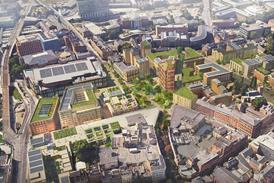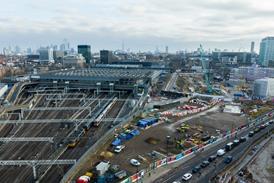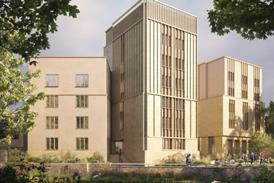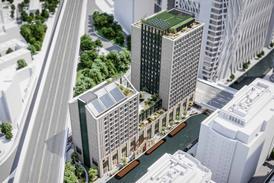With market conditions for private developers difficult, councils can step in and build the homes we need but they require support from ministers, writes Anthony Okereke

With more than 105,000 households living in temporary accommodation and thousands more sleeping on the streets, we need new housing on a scale unlike ever before.
In fact, the last time we needed homes anywhere near as much as we do now, councils built nearly half of them.
That was just after World War II. Fast forward to today and there are families living over an hour away from their children’s school and telling bedtime stories in budget hotel rooms night after night.
It’s been proven before that councils can be the answer to the housing crisis.
After all, we’re the local experts who know our boroughs inside out; we know how to engage with communities, what is needed – what will work and what will not work.
And we’ve never been needed more. The state of play for private housebuilding is grim. Just recently I met with a large national developer who told me they were preparing to shrink their business by 25%. It’s not necessarily their fault; demand for affordable housing is huge, but its profit margin compared to breathtaking construction costs means that they just can’t deliver.
There needs to be a council-led housebuilding era, supported by flexibility and greater partnerships to bring forward the right infrastructure.
So fewer homes are being built, when it should be more than ever. And it is no wonder – it’s cheaper to bulk buy homes from the open market than it is to build them, and private developers are pulling back from building as a result.
So there’s an opportunity in a broken market and we have an obligation to take it. But the reality is councils alone don’t have enough money, trust – or freedom – to get shovels into grounds, bricks into walls, and people into homes
There needs to be a council-led housebuilding era, supported by flexibility and greater partnerships to bring forward the right infrastructure. A public sector led solution.
In Greenwich we have an ambitious council housing programme, aptly named Greenwich Builds, which will deliver 1,750 sustainable new homes. With more than 740 homes now complete or underway we’re making great progress and it’s something I’m very proud of. I have met the council tenants who are living proof that council housing can, and should, be the answer.
But we’re trying to break ground with our hands tied behind our back, hampered by tiny budgets and red tape stronger than the economy. To do this properly we need a joined-up approach with partners in the NHS, environment agency and power networks, not to mention Transport for London, the police and National Rail.
And like everything, it starts with money. We’ve just been quoted an eyewatering £9m to build 15 new homes, on free land! That is £600k, per unit, just to build. We were already struggling to build roofs before inflation went through it.
Funding needs to come in longer-term, fairer settlements over 10-year timescales
The government has lifted the local authority borrowing cap, which is a step in the right direction, but more can be done to allow flexibility on right to buy receipts and to provide clarity on the future of the infrastructure levy.
And fundamentally, the government (whichever party leads it) needs to be more organised. Funding needs to come in longer-term, fairer settlements over 10-year timescales. That will allow us to effectively plan how we will use it, rather than counting every penny today wondering whether we will be able to afford bricks tomorrow.
We also need to see targeted investment in key areas. We’re lobbying for specific funding for fire safety and decarbonisation – improvements that mean housing is better and lasts longer, saving money in the long term.
Greenwich council is already investing £21m into renewing more than 600 homes to make them warmer and environmentally sustainable for tenants. Being able to invest even more into this would not only improve more lives, but also help authorities cut their carbon emissions and allow us to focus on building. We need to see the government match these efforts with greater funding for retrofitting, as this is such a win-win way to create better standard homes.
But money goes hand in hand with trust. Trust from central government to back the public sector to deliver what it can’t; and trust from the community that new housing is a good thing by showing them how it can be done right.
I understand the hesitation – public services are already stretched so the idea of the council adding more names to your doctor’s waiting list isn’t ideal.
In Greenwich we make sure that development is supported by investment in infrastructure and community. When a development is not fit for purpose – believe me – we’ll do something about it. Just look at Mast Quay.
There are ways to build and not upset existing communities. It’s about maximising what residents get in return for new development. At our flagship Greenwich Builds scheme at Kidbrooke Park Road, one of the largest council housing developments in the country, we’re not just building more than 400 homes, we’re adding a new nursery, first class landscaped public spaces with over a hundred new trees, and a state-of-the-art energy centre to provide sustainable heating and hot water for all of those homes.
New housing can help the whole area move forward. The level of development we need won’t be solved by a few flats here and a few flats there, squeezed in on any available patch of concrete. For the scale we need, we need to earn residents’ trust that we’ll be providing the infrastructure to support it, and to do that we must trust that our partners will back us up.
That’s why we need all the key players at the table to earn residents’ trust through cohesive developments.
For the scale we need, we need to earn residents’ trust that we’ll be providing the infrastructure to support it, and to do that we must trust that our partners will back us up.
It’s why we pushed hard for the Elizabeth Line to be extended to our neck of the woods, and why we’re doing that again for an extension of the DLR to Thamesmead. Having that transport link available would be an absolute gamechanger for our ability to build houses that are truly connected.
So we need money, and we need trust, and the final thing we need is freedom.
We need the freedom to actually build. Navigating the planning system can sometimes be like hitting your head against a brick wall that you haven’t had permission to build yet. If the Government trusts us with the funding, and residents trust us to deliver, we need the flexibility within the system to make it work quickly – free from call-ins, endless application reviews or surveys.
If we work with all the relevant public bodies on the initial approach, the landing would be so much smoother.
> See also: How Westminster council is rewriting the rules for council housing and urban regeneration
Money, in the shape of long-term settlements, targeted investment and staffing.
Trust, to deliver quality new neighborhoods with the right infrastructure.
Freedom, to do what councils in the past have done and build our way out of this crisis.
Money, trust, and freedom. That’s what councils need to build more homes.
Postscript
Anthony Okereke is leader of Greenwich Council
















No comments yet